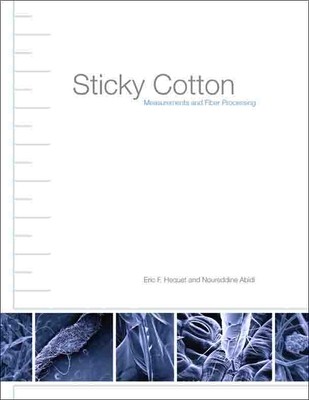
- We will send in 10–14 business days.
- Author: Eric F Hequet
- Publisher: Texas Tech University Press
- ISBN-10: 0896725901
- ISBN-13: 9780896725904
- Format: 22.1 x 28.6 x 2 cm, kieti viršeliai
- Language: English
- SAVE -10% with code: EXTRA
Reviews
Description
Cotton stickiness is a worldwide contamination problem. Stickiness is caused by sugar deposits produced either by the cotton plant itself or, most commonly, by honeydew from insects feeding on the cotton, usually aphids and whiteflies. Sticky cotton can cause residue to build up on textile equipment, leading to losses in productivity and quality. Following a general overview of cotton stickiness, the authors evaluate various detection methods, including chemical tests and physical tests, and review the advantages and limitations of high-speed stickiness detectors. They also discuss the effect of stickiness on fiber processing, productivity, and yarn quality. Sticky Cotton is an essential reference for anyone searching for ways to avoid or mitigate the problem of cotton stickiness. Eric F. Hequet is Associate Director of the International Textile Center at Texas Tech University. Noureddine Abidi is Head of Finishes/Chemical Research at the International Textile Center at Texas Tech University.
EXTRA 10 % discount with code: EXTRA
The promotion ends in 22d.00:17:09
The discount code is valid when purchasing from 10 €. Discounts do not stack.
- Author: Eric F Hequet
- Publisher: Texas Tech University Press
- ISBN-10: 0896725901
- ISBN-13: 9780896725904
- Format: 22.1 x 28.6 x 2 cm, kieti viršeliai
- Language: English English
Cotton stickiness is a worldwide contamination problem. Stickiness is caused by sugar deposits produced either by the cotton plant itself or, most commonly, by honeydew from insects feeding on the cotton, usually aphids and whiteflies. Sticky cotton can cause residue to build up on textile equipment, leading to losses in productivity and quality. Following a general overview of cotton stickiness, the authors evaluate various detection methods, including chemical tests and physical tests, and review the advantages and limitations of high-speed stickiness detectors. They also discuss the effect of stickiness on fiber processing, productivity, and yarn quality. Sticky Cotton is an essential reference for anyone searching for ways to avoid or mitigate the problem of cotton stickiness. Eric F. Hequet is Associate Director of the International Textile Center at Texas Tech University. Noureddine Abidi is Head of Finishes/Chemical Research at the International Textile Center at Texas Tech University.


Reviews